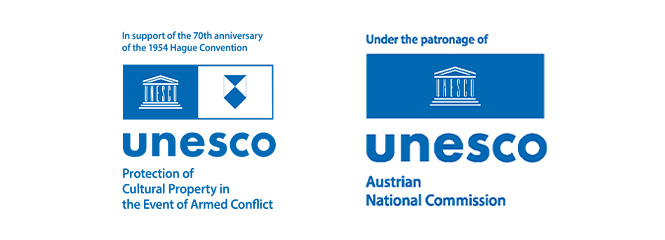online via Zoom

The Center for Cultural Property Protection invites you to the 1st event of the Anniversary Edition of the lecture series Spotlight Cultural Property Protection on the occasion of 70 years of the Hague Convention.
The first evening will focus on the history of the 1954 Hague Convention and prior attempts to protect cultural heritage in conflict situations.
Speakers for this session will be Nigel Pollard from Swansea University and Tim Le Berre from the French Army, chaired by Florian Meixner from the Austrian Commission for UNESCO.
Nigel Pollard
is Professor in the Department of History, Heritage and Classics at Swansea University in Wales. He has a PhD from the University of Michigan, and is a Fellow of the Society of Antiquaries of London.
Professor Pollard’s original academic training and experience were in Roman archaeology, and he undertook fieldwork in Italy, Tunisia, Egypt and Syria as well as the UK. About a decade ago, the emphasis of his research shifted to the destruction and protection of cultural heritage in Italy in the Second World War, and his book Bombing Pompeii: World Heritage and Military Necessity was published by the University of Michigan Press in 2020. He has a particular interest in the application of historical lessons to protection of cultural heritage in modern conflicts, and consequently is a member of UK Blue Shield and has contributed to the training of the contemporary UK military Cultural Property Protection Unit.
Abstract: From 1907 to 1954: The Evolution of the 1954 Hague Convention Through Two World Wars
This presentation will evaluate how key provisions and features of the 1954 Hague Convention (an international convention whose sole remit is protection of cultural property in conflict) reflected and responded to the deficiencies of previous International Humanitarian Law (IHL) on the subject.
A degree of protection was extended to cultural property in war by provisions of the 1907 Hague Convention (IV) respecting the Laws and Customs of War on Land, a wide-ranging convention governing the conduct of warring states. Its treatment of cultural property was by necessity limited given the broad scope of the convention, and, while it continued to apply through two world wars, it failed to address the dramatic changes in warfare that occurred between 1907 and 1945. Many of the deficiencies of the 1907 Hague Convention with respect to cultural property were apparent in the First and, especially, the Second World War.
This practical wartime experience provided important lessons for the framers of the 1954 Hague Convention and its protocols, and shaped some important provisions of that body of IHL. This presentation will examine some of those lessons and how they shaped the 1954 Convention, including the issues of defining ‘cultural property’ and ‘centres containing monuments’, the problem of ‘immediate surroundings’ of cultural sites, the provision of specialist cultural property protection personnel, and their cooperation with civilian heritage authorities. It also considers the importance of inter-war provisions that were not implemented in the Second World War, such as the 1922 Hague Air Rules, impacted on the 1954 Hague Convention and the First Geneva Protocol of 1977.
Captain Tim Le Berre
holds a master's degree in art history and heritage conservation from the École du Louvre, and a master's degree in military history from the University of Heidelberg. As curator and military historian, he worked at the German Army Museum in Dresden after graduating, and joined the French army in 2013. He commanded a platoon as fire officer in the artillery at the 1er Artillery Regiment between 2015 and 2019. He took part in several overseas operational deployments, including Djibouti, Senegal and Mali. Between 2019 and 2023, he held the position of deputy director at the army's heritage office in Paris, where he developed the implementation of the military protection of cultural property and led numerous deployments as cultural Property Protection Officer. Since August 2023 he is appointed as curator of the French Foreign Legion Museum and French Army Referent for Cultural Property Protection in Operations.
Abstract: Cultural Property at War: A French Military Expertise?
From 1870 onwards, new military equipments led to major destruction, and during the two world wars, particularly extensive destruction of cultural heritage. The French army responded with a special model of military protection of cultural properties. Created during the First World War, these true soldiers of art took part in the protection and evacuation of works of art in combat zones. The new challenges posed by the militarisation of the protection of cultural property have led those involved to respond to a number of challenges with regard to this new mission.
The successful experience of organizing and implementing a military protection for cultural property during the First World War was renewed and improved during the inter-war period, and then implemented again from 1939 onwards.
With the Liberation of France beginning in 1944, a third military service was set up to protect works of art. This collaboration with the British and American Fine-Arts Officers proved invaluable at a time when new international discussions on the protection of cultural property in the event of armed conflict began in the 50s. In May 1954, Rose Valland represented France at the signing of the 1954 Convention, demonstrating the crucial link between experience in the field and the necessity for enhanced protection of cultural property during conflicts.
To join the online lecture, please register via this link. After registering, you will receive an email with the Zoom link to the online event.
The lecture language is English.
No registration fee.

The Spotlight Cultural Property Protection lecture series 2024 is organized in celebration of the 70th anniversary of the 1954 Hague Convention for the Protection of Cultural Property in the Event of Armed Conflict.
#SpotlightCPP

More Information
Tags





